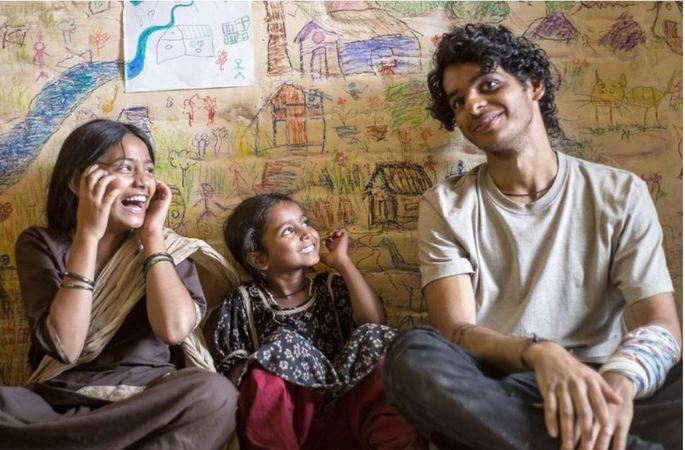There’s something magical about Beyond the Clouds, an exquisite yet obnoxious Indian-set movie. Majid Majidi is an Iranian film director whose poignant stories have never failed to evoke the deeper feelings of the viewers.
Along with Abbas Kiarostami and Mohsen Makhmalbaf, Majid Majidi was one of a few remarkable Iranian filmmakers to emerge in the 1990s.
His Oscar-nominated film, Children of Heaven (1997) – a simple tale of a brother and sister and a pair of shoes, remains one of the most heart-warming stories to date.
Beyond the Clouds is Majid Majidi’s latest film and is set in the bustling landscape of modern-day Mumbai.
Amir, a teenager who works as a drug runner, whirring about in the Mumbai traffic delivering drugs to numerous people, struggles as his divorced sister, Tara, get intertwined in a series of events and jailed for wounding a man who attempts to rape her. Aamir visits her in jail, and visits her attempted rapist Akshi, in the hospital to make sure he does not die. His survival would ensure that Tara will not be charged with murder and will be released. Amir takes care of Akshi’s children and his mother, who comes to care for him. At one point, Amir was tempted to sell off Akshi’s teenage daughter to a man who runs a brothel. But at the last minute, his moral consciousness and compassion awaken in him, and he saves her.
Throughout the film, the labyrinth of a thousand facets of the human mind is interpreted across every character.
Unlike Slumdog Millionaire, which romanticises India’s slum life, Majid Majidi’s Beyond the Clouds explores deep into the life behind the dark curtains of poverty and hardship.
Far from delving into the root cause of global poverty, Boyle’s film suggests that the western world alone possess all the answers to the third world’s problems.
Adding to the market fetishisation of Indian poverty, rather than looking at the underlying human struggle, Slumdog Millionaire catered to the western audience, with its popular poverty myths and images of the violence of India.
In contrast, Beyond The Clouds tries to understand its subjects and their battles from a grassroots level. In Slumdog, as it is in the film, the characters are shown as reality television participants, against the backdrop of historical tragedy and communal violence which accords with the popular western narrative of India.
At any point, the viewers are unable to connect with the characters as fellow humans. The superficial portrayal of the characters, interwoven around hyper cinematic violence and poverty porn, is carefully staged to arouse the unnecessary sympathy of the western audience.
Majidi, in contrast, has been extra sensitive in his portrayal of this profoundly Indian story.
All the vibrant visuals of the movie such as Mumbai Streets, Markets, Jails, Kamathipura, Dhobi Khana, and the ecologically extinguishing peripheries of the city, are beautifully portrayed through the detailed perspective of Majidi.
Majidi’s vision ensnares Mumbai’s stained underbelly, its dark secrets, distressing poverty, the exploitation of the less privileged and the mutual compassion of the marginalised communities.
The film strikes a chord of resonance with Mira Nair’s movie Salaam Bombay in many ways.
In the final moments of the film, there are extended scenes of India’s colourful Holi festival. Uninhibited movements of joy and celebration are creatively captured, to the delight of the viewers.
Majidi’s nuances and tinges, which are beautifully woven into the silk threads into the fabric of this story, make it extra picturesque. Similar to all his previous movies, Majidi takes special attention in portraying child psychology in Beyond the Clouds. Viewers can see the world of children unfolding artistically, starting from the opening scenes of the movie.
The childishness in the drug-boy Amir is paraded from time to time as the movie develops from scene to scene. Tara’s house, where Amir and Akshi’s family stay, becomes alive through shots of the pigeons dwelling in a room. Children paint the wall with their scribblings using crayons. Amir dances to a song in front of the children, and they also do performances in front of him. In prison, Tara befriends a little boy whose mother is extremely sick and eventually dies. The little boy plays with a rat, and Tara buys him a toy car through Amir. There are many moving vistas in the movie for anyone who loves the world of children.
This film shows much love, compassion, and empathy, which develop eventually between these characters, despite the utter bleakness and austerity of their lives. It reminds us of the good that dwells in us. No matter how cruel and unforgiving our realities can be, there is always hope and the possibility of optimism.
Cast: Ishaan Khattar, Malavika Mohanan, Goutam Ghose, Tannishtha Chatterjee, GV Sharada, Amruta Santosh Thakur, Shivam Pujari
Director: Majid Majidi



